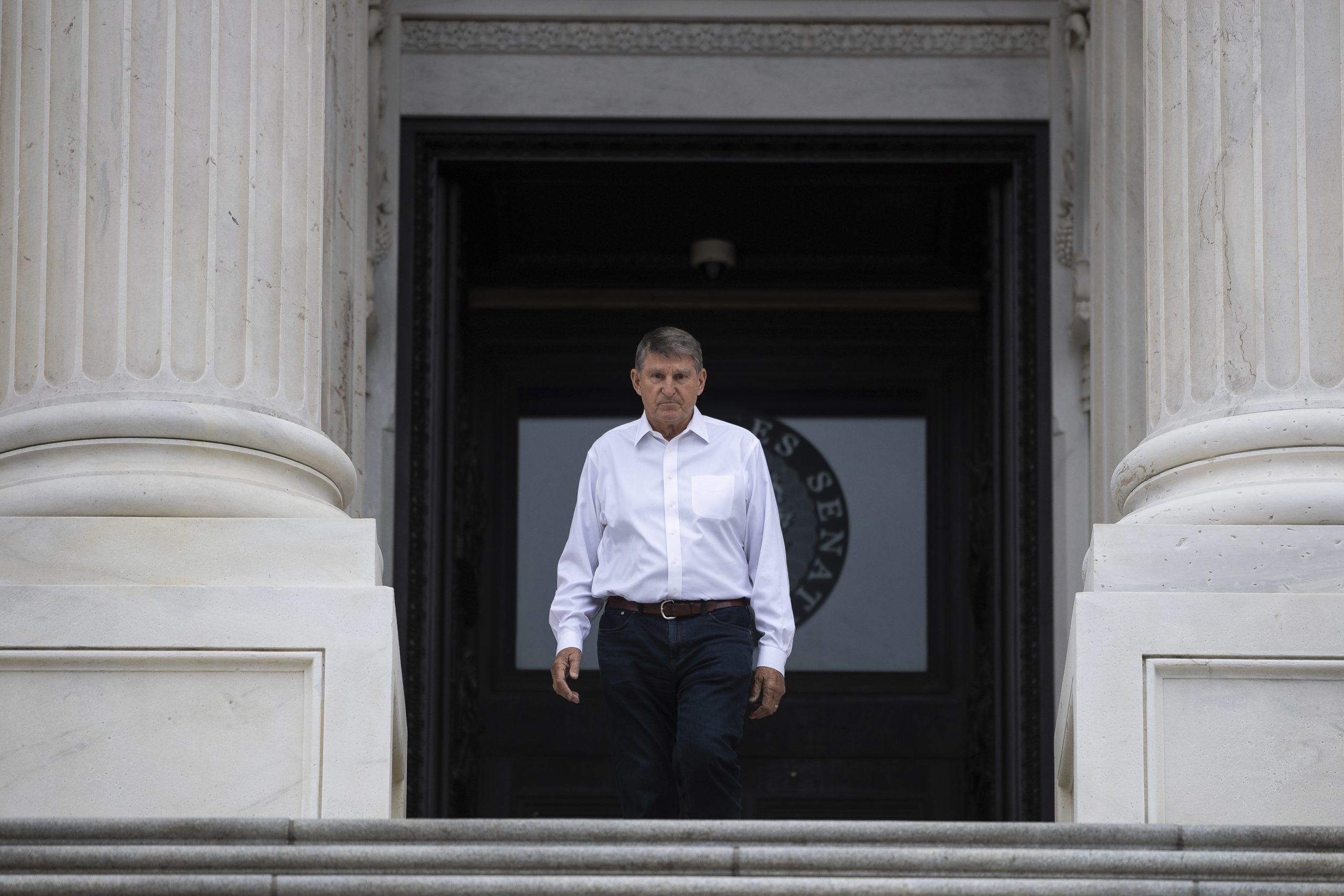
[ad_1]
That’s because Manchin is the only candidate with a prayer of keeping his Senate seat blue. And if Republicans win the presidency in 2024, they’d only need one Senate pick-up to take control.
So some fellow Democrats are letting Manchin know he’d be making a mistake.
“I have advised him against it. I think it would be a terrible idea,” said Sen. John Hickenlooper (D-Colo.) recalling a conversation with Manchin this spring. “It would help Donald Trump.”
Manchin’s private reaction, as recalled by Hickenlooper, reflects his public indecision: “He looked at me and he nodded.”
Keeping an open mind is central to Manchin’s political identity — and his ability to achieve his goals. In this case, it may boost his hopes to fully enact his preferred energy permitting reforms, as well as increase his sway over the implementation of energy provisions in the party-line Inflation Reduction Act.
What’s more, Manchin doesn’t see a No Labels run the same way most Democrats do. In an interview, he questioned the assumption that it would inevitably be a spoiler for Democrats.
“Then how did Perot get Bill Clinton elected?” Manchin asked, referring to the 1992 Reform Party bid that siphoned votes from the GOP nominee.
“Everybody’s getting so worked up and scared to death, and we’re a year and a half away,” he added. “Is there any alternative? Is there anything that we can do to bring both the Democrat and Republican Party back to centrist policy?”
The filing deadline for West Virginia’s Senate race is not until January, giving Manchin roughly six months’ time to decide. In the meantime, he’s opposing some of President Joe Biden’s nominees, voting to roll back some of the president’s policies and criticizing the administration as “radical” on energy.
That track record could mean Manchin is steeling himself for one last Senate run in deep-red West Virginia. Or it could also serve as a portfolio for a presidential candidate unaligned with either major party.
Sen. Jon Tester (D-Mont.) conceded that “you never know about Joe” but said that “it would be bad for the country if Joe didn’t run for U.S. Senate.”
Manchin has irked many progressives by helping tug the Democratic agenda rightward. He blocked Neera Tanden’s nomination to become Biden’s budget director and slashed trillion-dollar party-line legislation into what became the Inflation Reduction law (which he named). Just last week, he voted against three Biden nominees.
But in interviews with more than a dozen senators, a clear picture emerged. Democrats across the ideological spectrum say that despite Manchin’s more conservative views on environment and social issues, he’s their only shot in West Virginia.
Sen. Gary Peters (D-Mich.), who chairs the caucus’ campaign arm, said Manchin is “still thinking” through a possible presidential campaign.
“I’m encouraging him to run for the Senate every opportunity I get,” Peters added.
Manchin won his Senate races by healthy margins in 2010 and 2012, then won by 3 points in 2018. If he runs again, he’ll face his toughest race ever.
Popular West Virginia Gov. Jim Justice is running for the GOP nod to take him on, and some Republicans argue that Manchin might run for president to stay relevant and avoid a loss to his political rival.
Allies say that’s not the case.
“My gut tells me that that’s not going to happen. And my gut tells me there’s still a really good likelihood that Joe’s gonna run for reelection. And we need him, too,” said Sen. Tim Kaine (D-Va.). “If Gov. Justice thinks he’s gonna sweep Joe Manchin aside, I know that Joe Manchin is like, ‘Are you kidding me? No way.’”
Sen. Richard Blumenthal (D-Conn.) said that “I have trouble seeing Senator Manchin doing anything that would put Donald Trump back in the White House.”
“I’m hardly original in thinking that a third-party candidate would have unpredictable and unknown [consequences] that certainly could be in favor of Donald Trump,” Blumenthal added.
So why not just take running for president off the table? Hickenlooper likened Manchin’s indecision to a patient’s knee that twitches when tapped by a doctor: “It’s a reflex.”
“I don’t rule out anything. There’s a tremendous concern about our country and the direction the country is going in. That’s all. We’re talking about whether it’s going to hurt anybody if there’s some kind of interest in trying to save the centrist, moderate middle,” Manchin said.
Manchin is one of just four true moderates left in the Senate these days, along with Lisa Murkowski (R-Alaska), Susan Collins (R-Maine) and Kyrsten Sinema (I-Ariz.), who left the Democratic Party last year. Yet Sinema hasn’t openly called for a third-party presidential candidate.
Murkowski, who along with Collins says she would support Manchin’s Senate reelection, said he would leave a “hole” in the Senate if he left. As someone who dispatched a Trump-backed primary challenger last year while also trying to work with Biden, she also seems to understand Manchin’s reasoning.
“Sen. Manchin is a smart politician and a smart legislator and a smart person with all these options,” she said. “I think there is room for a candidate at the national level who is willing to bridge differences between what we have in our parties right now.”
That sounds at least a little like Manchin. And it’s not that hard to see where Manchin is coming from: He’s a former governor of a once-proud Democratic state that’s turned red over the last two decades, voting for Trump twice by huge margins. He took tons of flak from Democrats and Republicans during the first two years of Biden’s presidency.
He likes Biden but blanches at the way the president’s administration governs. And he’s watched Justice switch party affiliation from Democratic to Republican, a move Manchin so far has resisted.
With that in mind, he’s perfectly happy being part of the presidential conversation — for a while longer, at least.
“I’m in no hurry,” Manchin said.
[ad_2]
Source link
